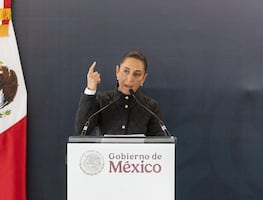Más Información

Derrota de México en disputa por maíz transgénico contra EU; estos son los argumentos de Sheinbaum y AMLO para prohibirlo

Óscar Rentería Schazarino, ha operado contra CJNG, Viagras y Templarios; es el nuevo secretario de Seguridad en Sinaloa

Claudia Sheinbaum pide respeto para Maru Campos; gobernadora anuncia acuerdo para transporte público

Claudia Sheinbaum anuncia los Centros de Cuidado Infantil en Chihuahua; inaugura hospital en Ciudad Juárez
A person working in Mexico’s informal market can make more than MXN$15,000 a month by selling bottled water, candy, or chips around the capital’s National Palace, which is little more than what a professional in biological sciences usually makes.
Biological science professionals have the highest wages in the country—an average of MXN$13,812 a month, according to a study on employment trends issued by the Ministry of Labor and Social Welfare (STPS) .
Architecture, urbanism, and design graduates are next, with MXN$13,549. On the other hand, graduates of humanity majors make MXN$10,365 on average, while art majors make barely MXN$9,768, according to the Labor Observatory, taking into account the fourth quarter of 2018.
Cuauhtémoc Rivera, chairman of the National Alliance of Small Merchants (ANPEC)
, said Mexico’s informal economy had shown an upward trend, even during the first five months of Mexico’s new federal government.
In an interview with Notimex , he claimed that the informal vendors market had gone from being a survival tactic to a governance criterion. “What would these people do if their sales posts were to be removed when there are no work opportunities in Mexico, except for truly precarious jobs,” he stated.
The situation is more than concerning since it puts people’s health at risk and poses a threat to public security. These sales posts are an opportunity for criminal groups to sell counterfeit products without health registrations.
In spite of a recent 16.21% increase in the minimum wage at the national level —100% in states near the U.S. border—labor conditions in Mexico have pushed 52% of its population to the informal market.
These commercial activities show large returns for criminal groups in Mexico since informal vendors do not pay taxes and are not obliged to meet any standards whatsoever.
Rivera insisted that the black market saw returns of enormous proportions. While a formal worker makes barely MXN$100 an hour, an informal vendor working at some of Mexico City’s most popular spots can make around MXN$500 a day.
Informality by the numbers
The National Survey on Occupation and Employment (ENOE) for the last quarter of 2018, conducted by the National Institute of Statistics and Geography (INEGI) , revealed that informality was a persistent problem due to dismissals of staff and a surge in low-paying jobs.
Informal economy accounted for 30% of Mexico’s Gross Domestic Product (GDP) during the first quarter of President Andrés Manuel López Obrador’s administration , which shows a growing decline in labor conditions for Mexicans.
Mexico is also the country with the highest working time per capita, amounting to 2,225 hours a year , and the lowest incomes per working time, according to the Organization for Economic Co-operation and Development (OECD) .
The thriving of the informal market in the country is causing an economic loss of MXN$43 billion a year .
Informality: A pressing matter
According to Rivera, Mexico’s new government must work to improve tax policy, noting that the Mexican government has shown an appalling shortsightedness with regard to the job market since the past administration, and that raising taxes for those working in the formal market would only put more pressure on the middle class.
He reminded that the administration of Enrique Peña Nieto (2012-2018) had gone down that road and applied more rigor to the working class while giving a free pass to those working in the informal market.
“If the new administration’s goal is to fight corruption, informality is one of the most pressing issues since it affects all of society,” Rivera argued, adding that it would not be feasible to raise taxes and hurt the formal income even further.
dm







